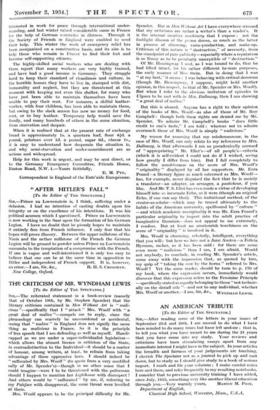THE CRITICISM OF MR. WYNDHAM LEWIS
[To the Editor of Tau SPECTATOR.]
Sut,—The reiterated statement in a book-review (namely that of October 19th, by Mr. Stephen Spender) that the literary criticism contained in Men Without Art is " mali- cious "—specifically that I " attack " Mrs. Woolf with " a great deal of malice "—compels me to reply, since the phraseology can scarcely be unconsidered or accidental, seeing that " malice " in England does not signify the same thing as malicieux in France. So it is the principle of free speech that I am defending as well as myself. Handi- capped as we are under a super-individualist legislation— which allows the utmost licence in criticism of the State, in contradistinction to the Individual—it should be a matter of honour, among writers, at least, to refrain from taking advantage of these oppressive laws. I should indeed be " suffocated by Mrs. Woolf " (to quote from a very muddled sally of Mr. Spender's)—though in no other sense that I could imagine—were I to be threatened with the policeman should I happen to mention her Lighthouse with disrespect And others would be " suffocated " by me, if, referring to my Paleface with disapproval, the same threat were levelled at them.
Mrs. Woolf appears to be the principal difficulty for Mr.
Spender. But in Men ithout Art I have everywhere stressed that my criticisms are rather a writer's than a reader's. It is the internal creative machinery that I expose : not the footlight illusion of the prima donna, so much as the latter in process of slimming, voice-production, and make-up. Criticism of this nature is " destructive," of necessity, from ' the standpoint of pure publicity—especially where a reputation is so flimsy as to be peculiarly susceptible of " destruction."
Of Mr. Hemingway I said, as 1 was bound to do, that he had lifted intact, for his rather different he-man purposes, the early manner of Miss Stein. But in doing that 1 was " at my best," it seems : 1 was behaving with critical decorum (though Mr. Hemingway, I suppose, might hold another opinion, in this respect, to that of Mr. Spender or Mrs. Woolf). But when I refer to the obvious imitation of episodes in Ulysses to be met with in Mrs. Dalioway, then I am showing " a great deal of malice."
But this is absurd. Anyone has a right to their opinion of the books of Mrs. Woolf—as also of those of Mr. Roy Campbell : though both these rights are denied me by Mr. Spender. To admire Mr. Campbell's books " does little credit to one's taste," I am told whereas not to admire overmuch those of Mrs. 1Voolf is simply " malicious."
My reason for assuming that my misdemeanour, in the case of Mrs. Woolf, can only relate to my references to Mrs. Dalloway, is that afterwards I am so paradoxically accused of " appropriating " Mr. Eliors-L-of all people's—criteria (which it is self-evident I could not do if I wished, seeing how greatly I differ from him). But I fail completely to follow the sensitiveness on the score of Mrs. Woolf s " originality " displayed by all her supporters. Mr. Ezra Pound—a literary figure as much esteemed as Mrs. Woolf— has, for example, never disguised the fact that he is mainly a translator—an adapter, an arranger, a pasticheur, if you like. And Mr. T. S. Eliot has even made a virtue of developing himself into an incarnate Echo, as it were (though an original Echo, if one can say that). This imitations] method, of the creator-as-scholar—which may be traced ultimately to the habits of the American university, spellbound by " culture " —and which academic unoriginalihj it was Mr. Ezra Pound's particular originality to import into the adult practice of imaginative literature—does not appeal to me extremely, I confess. But at least no amateurish touchiness on the score of " originality " is involved in it.
Mrs. Woolf is charming, scholarly, intelligent, everything that you will : but here we hare not a Jane Austen—a Felicia Hymens, rather, as it has been said : for there are some even more " malicious " than I am, I am afraid. Would not anybody, to conclude, in reading Mr. Spender's article, come away with the impression that, as quoted by him, my quip of " taking the cow by the horns " referred to Mrs. Woolf ? Yet the same reader, should he turn to p. 170 of my book, where the expression occurs, immediately would discover that this expression refers to the Feminine Principle —specifically stated as equally belonging to those "not technic- ally on the distaff side "—and not to any individual, whether Mrs. Woolf or another.—I am, Sir, &c., WYNDHAM LEWIS.














































 Previous page
Previous page